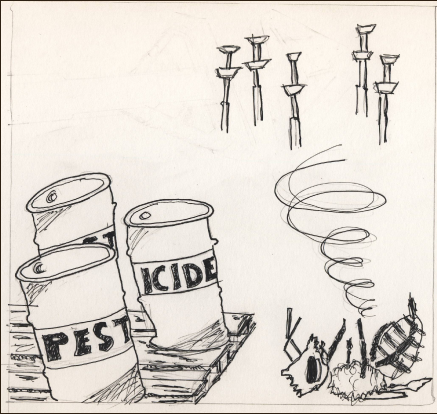Albert Einstein once said: “If the bee disappears from the surface of the earth, man would have no more than four years to live. No more bees, no more pollination… No more men!”
When people see a bee, their initial reaction is to freak out, run away or find something in which to kill the small buzzing insect. However, what they may not realize is that they are not just killing one seemingly useless bee but are endangering themselves as well.
The number of bee colonies has been rapidly depleting over the past few decades.
“The blame can be placed squarely on man’s shoulders: the industrial exploitation of nature, the excessive addition of chemicals to produce better quality honey (and crops) in greater quantities. The quest for more has backfired,” Jaques Tarner, writer for France’s “Science Actualités” magazine, said.
One might be wondering “Why are bees so important?” Simply put, bees are vital to the pollination process. Without them, certain plants would cease to grow which would result in animals not having food as well as humans not having the necessities for survival. Essentially, bees are one of the most basic parts of the successful operation of the ecosystem and are depended on for its survival.
“Bees, via pollination, are responsible for 15 to 30 percent of the food US consumers eat,” Nichelle Van Tassell, daughter of bee expert Luc Van Tassell, said, according to Florida Bee Removal.
Reasons for bee’s current decline include the use of pesticides and chemicals, diseases caused by mites and parasites, colony collapse disorder (CCD) and even the radiation from cell phones and other technological devices.
Colony collapse disorder occurs when bees leave the hive and for various reasons, fail to return and then die, which leaves the queen and eggs abandoned.
“The West Coast is thought to have lost 60 percent of its commercial bee population, with 70 percent missing on the East Coast. CCD has since spread to Germany, Switzerland, Spain, Portugal, Italy and Greece,” Van Tassell said, according to Florida Bee Removal.
The radiation from cell phones and other devices has been proven to disorient bees and prevent them from finding their way back to the hive.
Last week, local Lynchburg beekeepers and experts met to address various ways to care for and protect their bees. With so many hazards to bees, it is important that beekeepers know how to properly provide for their bees and to keep them on a good diet. This year, the Mt. Empire Beekeepers Association located in Wythe County received a $125,000 grant to help beekeepers in Southwest Virginia.
So while all of this may sound ridiculous to the average person, people need to be informed of the risks of bee extinction and what they can do to help prevent it, even if this means risking a little sting and not squashing one at the first opportunity.